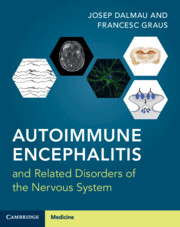Book contents
- Autoimmune Encephalitis and Related Disorders of the Nervous System
- Autoimmune Encephalitis and Related Disorders of the Nervous System
- Copyright page
- Dedication
- Contents
- Clinical Vignettes
- Videos
- Preface
- Abbreviations
- Section 1 Overview
- Section 2 Antibodies and Antigens
- Section 3 Specific Syndromes and Diseases
- Chapter 6 Limbic Encephalitis
- Chapter 7 Autoimmunity Against Proteins Associated with Voltage-Gated Potassium Channels
- Chapter 8 Anti-NMDAR Encephalitis
- Chapter 9 Seizures and Antibodies Against Surface Antigens
- Chapter 10 Acute Disseminated Encephalomyelitis and Myelin Oligodendrocyte Glycoprotein Antibody-Associated Disease
- Chapter 11 Neuromyelitis Optica Spectrum Disorders and Glial Fibrillary Acidic Protein Autoimmunity
- Chapter 12 Autoimmune Cerebellar Ataxias
- Chapter 13 Autoimmune Brainstem Encephalitis
- Chapter 14 Autoimmunity Against the Inhibitory Synapsis
- Chapter 15 Anti-IgLON5 Disease
- Chapter 16 Autoimmune and Inflammatory Encephalopathies as Complications of Cancer
- Chapter 17 Deconstructing Hashimoto Encephalopathy
- Chapter 18 CNS Syndromes at the Frontier of Autoimmune Encephalitis
- Section 4 Autoimmunity in Neurological and Psychiatric Diseases
- Index
- References
Chapter 17 - Deconstructing Hashimoto Encephalopathy
from Section 3 - Specific Syndromes and Diseases
Published online by Cambridge University Press: 27 January 2022
- Autoimmune Encephalitis and Related Disorders of the Nervous System
- Autoimmune Encephalitis and Related Disorders of the Nervous System
- Copyright page
- Dedication
- Contents
- Clinical Vignettes
- Videos
- Preface
- Abbreviations
- Section 1 Overview
- Section 2 Antibodies and Antigens
- Section 3 Specific Syndromes and Diseases
- Chapter 6 Limbic Encephalitis
- Chapter 7 Autoimmunity Against Proteins Associated with Voltage-Gated Potassium Channels
- Chapter 8 Anti-NMDAR Encephalitis
- Chapter 9 Seizures and Antibodies Against Surface Antigens
- Chapter 10 Acute Disseminated Encephalomyelitis and Myelin Oligodendrocyte Glycoprotein Antibody-Associated Disease
- Chapter 11 Neuromyelitis Optica Spectrum Disorders and Glial Fibrillary Acidic Protein Autoimmunity
- Chapter 12 Autoimmune Cerebellar Ataxias
- Chapter 13 Autoimmune Brainstem Encephalitis
- Chapter 14 Autoimmunity Against the Inhibitory Synapsis
- Chapter 15 Anti-IgLON5 Disease
- Chapter 16 Autoimmune and Inflammatory Encephalopathies as Complications of Cancer
- Chapter 17 Deconstructing Hashimoto Encephalopathy
- Chapter 18 CNS Syndromes at the Frontier of Autoimmune Encephalitis
- Section 4 Autoimmunity in Neurological and Psychiatric Diseases
- Index
- References
Summary
This chapter critically reviews the diagnostic criteria of Hashimoto encephalopathy (HE) and the misuse of this diagnosis. HE is usually considered in patients with subacute cognitive deterioration, myoclonus, change in behaviour, or seizures, accompanied by normal or non-specific MRI and CSF findings, normal thyroid function or mild hypothyroidism, increased serum levels of thyroid peroxidase (TPO) antibodies, and clinical response to steroids. The beneficial effect of steroids was emphasized by renaming the disease ‘steroid-responsive encephalopathy associated with autoimmune thyroiditis’ (SREAT). However, the diagnosis of HE has several important limitations. One is that there are no specific biomarkers of the disease. Moreover, the specificity of TPO antibodies is poor as they are also found in 13% of healthy persons. The significance of antibodies against the amino (NH2)-terminal domain of α-enolase, considered a potential biomarker of HE, is also unclear. Another limitation is that the diagnostic confirmation of HE depends on steroid-responsiveness. However, the clinical criteria and paraclinical findings do not identify the patients that will respond to steroids (<30%). Finally, most patients reported with HE are not investigated for neuronal surface antibodies. Overall, the weaknesses of the criteria and their misuse characterizing as HE any neurological syndrome with positive TPO antibodies that responds to steroids, raise doubts about the clinical usefulness of the term HE.
Keywords
Information
- Type
- Chapter
- Information
- Publisher: Cambridge University PressPrint publication year: 2022
